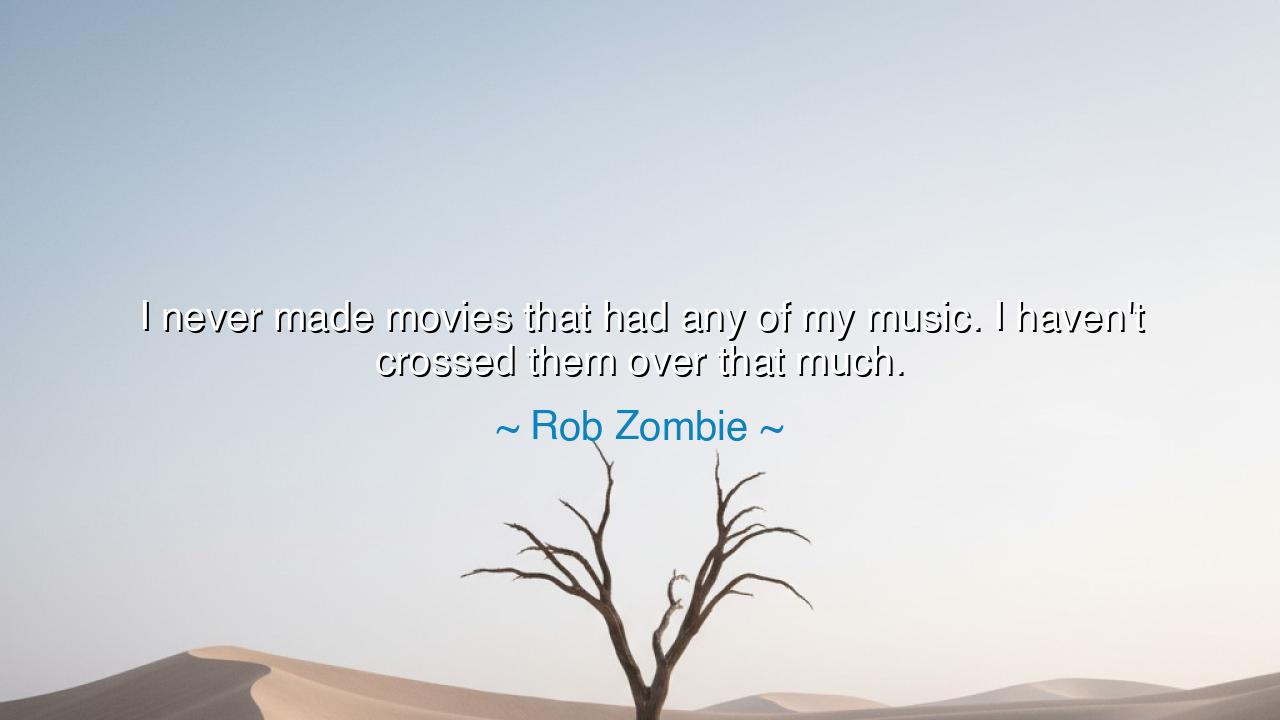
I never made movies that had any of my music. I haven't crossed






In the great universe of creation, there are those who seek to express themselves through many mediums, blending the boundaries of their talents, while others, like Rob Zombie, hold steadfast to the purity of their individual craft. When he states, "I never made movies that had any of my music. I haven't crossed them over that much," Zombie is speaking to the delicate balance between identity and artistic vision—the understanding that to maintain the integrity of one’s work, one must sometimes avoid the temptation to mix different forms of expression. This reflects a profound truth in the arts: that sometimes the true power of an artist lies in the focus and discipline with which they pursue a single form, creating something whole and uncompromised.
Consider the great philosophers of the ancient world, such as Socrates, who rejected the temptations of superficiality in favor of the purity of thought. Socrates did not delve into the writing of poetry or into the art of performance; instead, he committed himself to the philosophical dialogue, finding fulfillment in his chosen medium. His wisdom lay in his ability to focus on one pursuit, allowing his contributions to shape the very foundations of Western thought. Just as Socrates did not dilute his philosophy with the trappings of other arts, so does Zombie resist the temptation to cross his music with his cinema, preferring to keep each medium distinct in its own right.
In the realm of art, there is a certain purity that comes from pursuing a singular vision. The great architects of ancient times, such as Ictinos and Callicrates, who designed the Parthenon, did not stray from their architectural vision to become sculptors or poets; their focus was singular, and it was through that dedication to their craft that they achieved greatness. By limiting themselves, they were able to create a masterpiece that stood the test of time. Similarly, Zombie acknowledges that to achieve the deepest impact in his respective crafts—music and film—there is value in preserving the integrity of each medium without merging them. His statement serves as a reminder that sometimes the greatest creations emerge from concentration rather than the blurring of lines.
It is not uncommon for great artists to struggle with the idea of mixing different facets of their self-expression. Consider Leonardo da Vinci, who, though he was a master in both the arts of painting and science, understood that each pursuit required a different set of focus and tools. Da Vinci’s notebooks are filled with ideas for inventions and paintings, yet he chose not to create a grand masterpiece that combined all of his interests into one singular work. He understood that true mastery in any field—whether in art, science, or philosophy—comes not from spreading oneself too thin but from the depth and dedication given to a single pursuit. In this way, Zombie follows in the footsteps of those who sought to perfect their craft by keeping their mediums separate.
The wisdom behind Zombie’s words lies in the understanding that the purity of expression can be diluted when too many voices are allowed to speak at once. Much like Plato’s ideal of the philosopher-king, where wisdom and rule must be kept distinct for the sake of clarity and order, an artist must also maintain a clear sense of purpose in their work. When different forms of art—music and film, for example—are combined too freely, the message can become muddy and the impact less profound. Each work has its own purpose, its own aesthetic, and when allowed to develop separately, each can be more powerful in its own right.
Yet, within Zombie’s statement, there is also a deeper lesson about discipline and the importance of not yielding to the demands of the world. The ancient warriors, like Achilles, did not simply fight because it was their duty; they fought because they were called to do so. Their purpose was clear, their goal singular, and it was through this focused effort that they became legends. Zombie’s refusal to mix his music and his films is an echo of this dedication to a singular purpose. He knows that by keeping his crafts separate, he is preserving the authenticity and power of each form. This is not a rejection of one medium for the sake of another, but a commitment to crafting something that can stand on its own merits.
So, as we walk our own paths in this world, let us take the lesson from Rob Zombie and the ancient creators: that true mastery is often found in focus. It is in the clarity of purpose, the strength to resist the temptation to cross boundaries too hastily, and the commitment to one’s vision that greatness is achieved. Whether you are an artist, a leader, or a philosopher, you must learn to dedicate yourself to your chosen pursuit with the same intensity and integrity that the greatest artists of the past demonstrated. In doing so, you will not only create with meaning and depth, but you will ensure that your work, like the epic poems and masterpieces of old, stands as a testament to the power of a singular vision and purpose.






AAdministratorAdministrator
Welcome, honored guests. Please leave a comment, we will respond soon